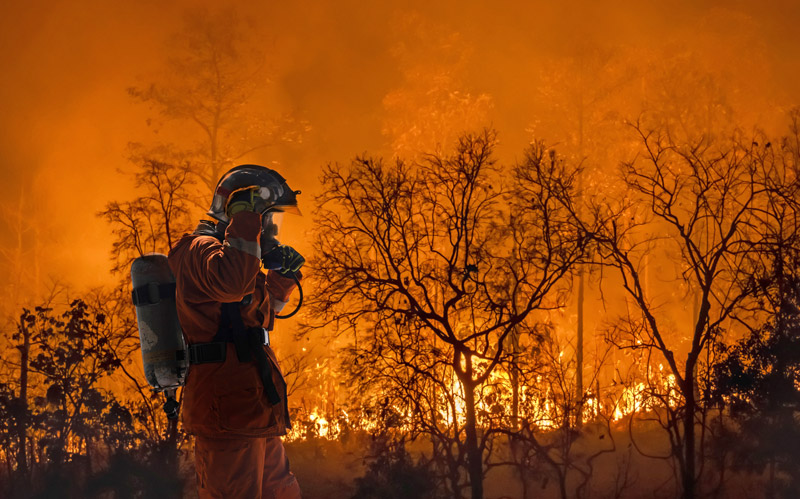When confronted with an emergency, people with autism spectrum disorder are at a greater risk for injury or death than their neurotypical peers. Many autistic children and adults lack safety awareness or the ability to follow basic safety rules. Even if they have these critical skills, each autistic individual has a unique profile of strengths and challenges that may impact their ability to safely respond to a natural disaster or other emergency.

In the 2021 National Autism Indicators Report: Family Perspectives on Services and Supports, approximately 40 percent of families said they hadn’t discussed emergency planning with their support teams (Roux et al., 2021). Qualified autism service providers are uniquely positioned to assist families in preparing for such events.
According to the Federal Emergency Management Agency (FEMA) 2023 National Preparedness Report, the United States faces increasing frequency and severity of climate-related disasters (FEMA, 2023). Autistic clients and their caregivers may face significant challenges, such as client skill regression, following disasters due to the temporary or permanent closure of autism service provider organizations. Indeed, one in four businesses do not reopen after a disaster. (FEMA, 2018). This makes it essential that autism service provider organizations have disaster preparedness and continuity of care plans.
A disaster preparedness plan for autism service provider organizations should be detailed and tailored to address the specific types of natural disasters most likely to occur in your geographic region, such as earthquakes and wildfires in California and tornadoes in the Midwest.
At a minimum, a disaster preparedness plan should include:
- Identification of a crisis planning, training, and response team.
- The location of a collection of emergency basics (e.g., first aid kit, flashlight, radio, batteries, food, water).
- A complete and up-to-date staff contact list that includes mobile phone numbers.
- A means to maintain communication during the disaster in the event of cell phone outages.
- An evacuation plan with a designated post-evacuation meeting point for staff.
- Regular verification of functioning early warning devices (e.g., smoke alarms).
- A detailed inventory list to assist with filing insurance claims, if necessary.
- A current backup of critical organizational data (e.g., service data, vendor contracts, tax documents, and other financials).
Continuity planning helps ensure that an autism service provider organization can continue to deliver essential services with minimal downtime in the wake of a disaster. A continuity of care plan must consider both the client’s and provider’s readiness to resume services.
Client considerations should include:
- Did the client or caregiver(s) sustain any injuries that would impact service delivery?
- Are the client’s basic needs being met (e.g., food, water, shelter)?
- Can services be provided where the client typically receives services (e.g., the client’s home or school)?
- Did the client have to relocate to a temporary shelter? If so, is this an appropriate location to deliver services, or does an alternative location need to be identified?
- Does the client need additional support as a result of the disaster, such as referral to a qualified mental health care provider?
In addition to client factors, an organization’s continuity of care plan must consider individual providers’ readiness to return to work after experiencing the trauma of a widespread natural disaster or other emergency. Organizations should identify an internal or external trauma response team to perform employee assessments and provide support. That can include paid time off or a leave of absence, mental health referrals, temporary reassignment to a different position, and removal from trauma response efforts.
Federal, state, and local entities—including FEMA, the American Red Cross, the Salvation Army, and state and county government agencies—offer resources to help organizations develop disaster preparedness and continuity plans.
The Council of Autism Service Providers (CASP) is a non-profit trade association of autism service provider organizations that have demonstrated a commitment to promoting and delivering evidence-based services. Several CASP members were impacted by Maui’s deadly wildfires in August 2023. These experiences highlighted the need for practical, autism-specific resources to help providers deliver safe, effective services when they themselves are also victims of natural disasters.
Recently, CASP created a working group to provide recommendations for sustaining functional business operations and service delivery following a natural disaster. CASP’s Community Emergency Guidelines: A Resource Guide for Autism Service Provider Organizations will include checklists, customizable templates, and brief narratives in a user-friendly format. The resource is expected to be released in Q4 2024 and will be freely available on the CASP website at casproviders.org
Kelly Bermingham, MA, BCBA, is Director of Center-Based ABA at Easterseals Southern California. Michael Wasmer, DVM, DACVIM, is Chief Operating Officer at Council of Autism Service Providers. Kristen Koba-Burdt, BCBA, LBA, CDP, is Director of Clinical Operations, Dallas Star, MBA, CDE, is Regional Director, Jessica Brown, LCSW, is Regional Director at BAYADA. Maria R.S. Solis, MA, BCBA, is Executive Director and Founder at Sasaki Behavior Group. Veronica Glickman, MA, MS, BCBA, is Chief Executive Officer and Founder at Autism Behavioral & Educational Services, Inc.
References
Federal Emergency Management Agency. 2023 National Preparedness Report. https://www.fema.gov/sites/default/files/documents/fema_2023-npr.pdf.
Roux, Anne M., Rast, Jessica E., Garfield, T., Shattuck, P., and Shea, Lindsay L. National Autism Indicators Report: Family Perspectives on Services and Supports. Philadelphia, PA: Life Course Outcomes Research Program, A.J. Drexel Autism Institute, Drexel University, May 2021.
Federal Emergency Management Agency. (2018, October 30). Stay in business after a disaster by planning ahead [Press release]. https://www.fema.gov/press-release/20230502/stay-business-after-disaster-planning-ahead




[…] by outlining best practices. Autism-specific toolkits also exist to help individuals, families, and service providers prepare for disasters, but people may be unaware of this information. There is still a need to […]